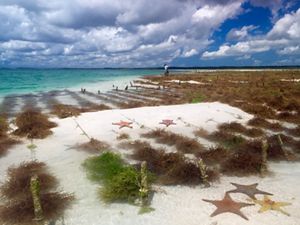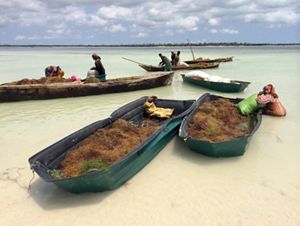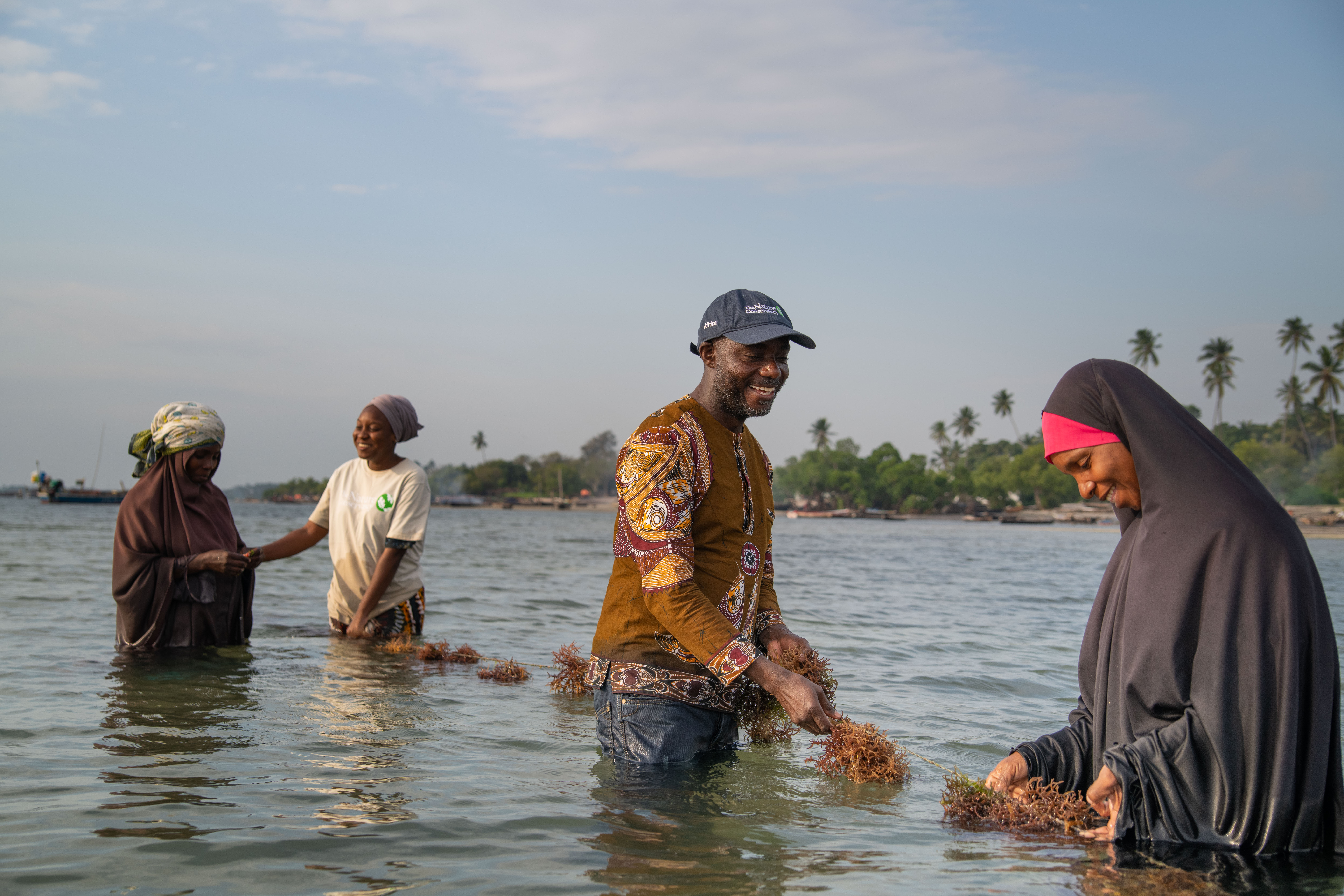The Promise of Restorative Aquaculture Solutions
Where seaweed thrives, people and nature can, too.
Seaweed farming is the third largest export industry in Tanzania—it employs over 25,000 farmers, most of whom are women. But as the planet’s ocean temperatures rise, the people who depend on coastal waters are at risk—and the very labor upon which they rely may be accelerating the decline of sensitive marine habitats.
Seaweed aquaculture, the farming of seaweed in coastal waters, is an incredibly important industry to rural Tanzanians. In addition to providing many women with livelihoods, seaweed farming presents an alternative to overfishing, which helps sustain the region’s fish stocks—a staple food source for communities. In recent years, however, the seaweed industry has experienced stagnation due to issues such as changing water quality conditions, poor seedstock and unsustainable farming practices.
When farmed well, seaweed aquaculture has the potential to be ecologically restorative and provide invaluable ecosystem services. In Tanzania, the marine areas in which seaweed farming are most established are actually among the highest priority regions to protect on the continent.

Since The Nature Conservancy (TNC) first began working in Tanzania in 2006, it has partnered with local communities and the Tanzanian government to protect the country’s most ecologically important places. Between the co-benefits for marine habitats and water quality with the industry’s importance to thousands of livelihoods, it is clear why seaweed aquaculture has become an important focus of TNC’s work in the region.
On Pemba Island, part of Tanzania’s Zanzibar Archipelago, TNC is conducting a community empowerment and environmental training program for seaweed farmers. The program, which works primarily with local women, is facilitated by the collaboration of local suppliers, government partners and universities, as well as a phase one partnership with Cargill through its sustainability initiative, the Red Seaweed Promise.
Most of the seaweed that is farmed in Tanzania is produced, dried and sold for use as carrageenan or agar thickening agents that are used in food products such as ice cream and cosmetics. But there is more potential still: tropical seaweeds may prove applicable for uses including sustainable animal feeds, biofuels, pharmaceuticals and nutraceuticals.
TNC has been working to understand and identify the key challenges and opportunities within the seaweed aquaculture industry in Tanzania, evaluating the goals and priorities of stakeholders and farmers and assessing where learnings from other geographies could help advance sustainable development in a way that benefits the ocean environment, coastal communities and local economies.
Our academic, government and industry partners have helped us identify the challenges for Tanzanian seaweed aquaculture, as well as the opportunities for TNC to work with local farmers and stakeholders in addressing them. Major challenges that Tanzanian seaweed farmers and their surrounding environments face include the unsustainable use of mangroves as seaweed stakes, damage to seagrass and warming water that is increasing seaweed disease and decreasing productivity. Protecting these environments while supporting seaweed aquaculture, especially through education and partnering with local women, is essential to conserving precious waters and wildlife.


TNC has identified significant potential to improve and advance the sustainable development of seaweed farming for both the social and environmental benefit of Tanzanians. Our conservation scientists and partners are working with local farmers on Unguja and Pemba Islands, part of the Zanzibar archipelago, to improve the efficiency of seaweed farming with a focus on trainings in better environmental management practices, smart seaweed farm siting and improved maintenance and farm design.
Sada Himidi Selemani, a member of the Tumbe village’s seaweed farmers group, Ipo Sababu, shares her perspective on the co-benefits of TNC’s conservation program for local women in Northern Pemba:
Quote
I am happy to participate in the new training program. Local women seaweed farmers are excited to gain insight into how to improve our seaweed production, so we can earn more for our families but also look after our environment.
The bounty off the coasts of Tanzania has empowered many women like Sada to support their families and communities over the years. As the world faces ecological challenges too big for any one nation to overcome alone, organizations like TNC must work together with governments, industry and communities alike to ensure that nature and people can thrive everywhere. Seaweed is a reminder that a sustainable path is possible—and the journey is already underway.
Global Insights
Check out our latest thinking and real-world solutions to some of the most complex challenges facing people and the planet today.



